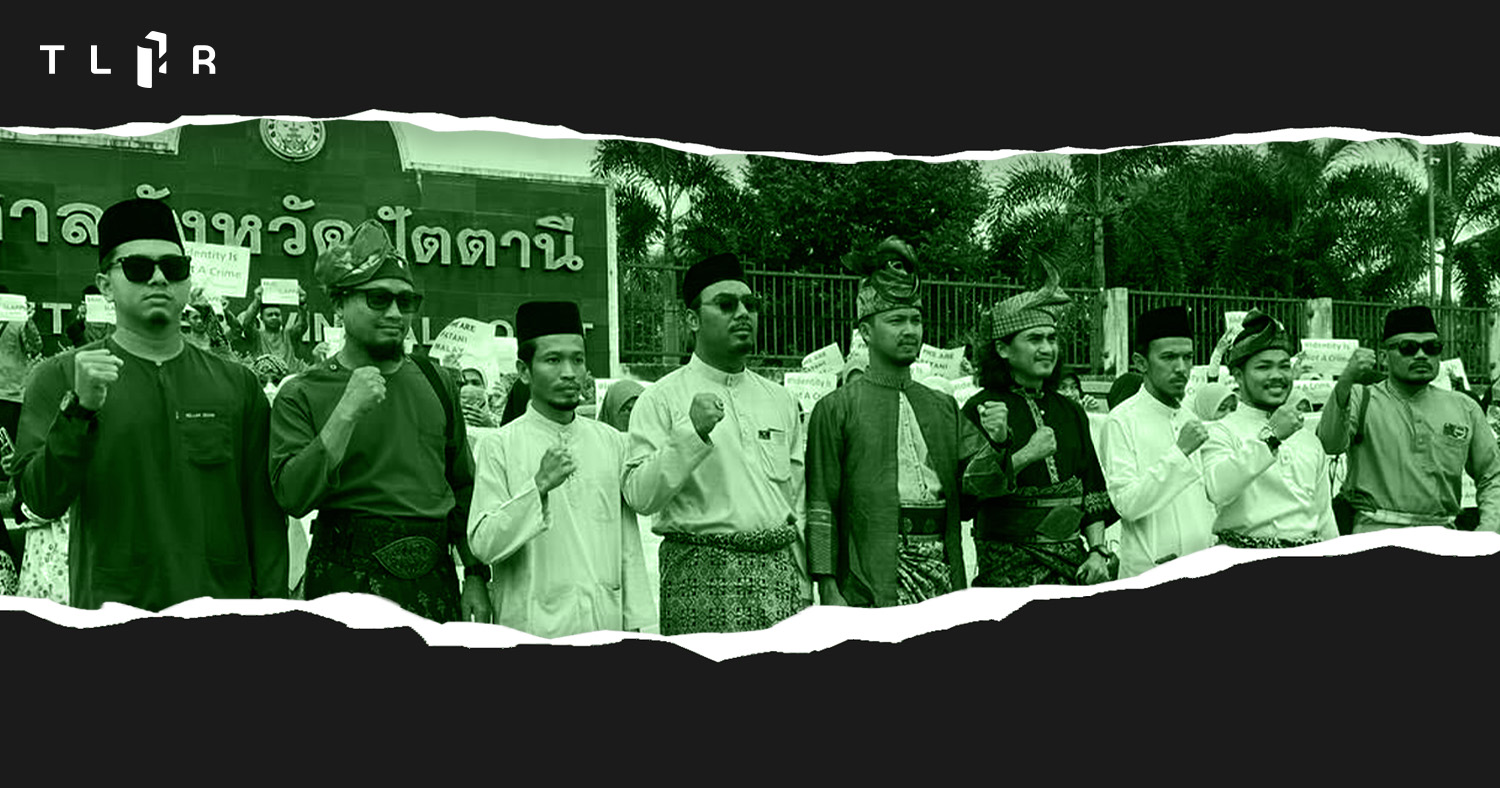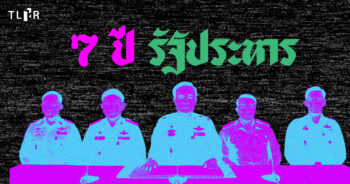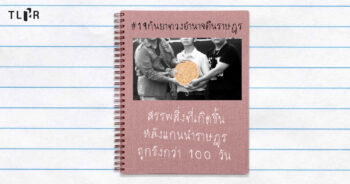On 23 January 2025, at the Pattani Provincial Court, a prosecutor from the Office of Criminal Litigation 4 Region 9 issued an indictment order against nine Muslim activists on charges under Sections 116 (sedition), 209 (secret society), and 210 (conspiracy) of the Criminal Code, as well as the Emergency Decree. These charges stemmed from their involvement in organizing the Melayu Raya cultural gathering, which attracted over 10,000 participants on 4 May 2022. The court granted their bail requests as the case is pending trial.
In this case, the Internal Security Operations Command (ISOC) Region 4 appointed a representative to file a complaint with the police at Sai Buri Police Station in Pattani Province. They claimed that the nine Muslim activists had engaged in seditious conduct by using language to incite youth to oppose the Thai government during the Maleyu Raya 2022 event.
On 14 December 2023, over one year and six months after the gathering, the organizers and those involved with the Melayu Raya 2022 gathering—nine people in total—were summoned by the Pattani Provincial Police to meet with inquiry officials on 9 January 2024. On that day, all nine of the accused went to the Sai Buri Police Station to hear the charges, along with their lawyers, relatives, observers, and civil society organizations. They denied all accusations.
Later on 25 July 2024, the inquiry official transferred the case file to the Pattani prosecutor and recommended that the accused be indicted.
The prosecutor indicted the 9 activists, stating that the defendants were members of the “Patani National Liberation Movement” and had incited participants of the Melayu Raya gathering to oppose the Thai government.
On 23 January, the nine Muslim activists traveled to the Pattani Provincial Court, where fellow Muslim supporters gathered to show solidarity. They held signs with messages such as “#Melayu #Anti-SLAPPs Raya” and “WE WANT FREEDOM OF EXPRESSION.”
The indictment from the prosecutor states that the 9 Muslim activists are members of the “Patani National Liberation Movement,” which seeks to separate the provinces of Pattani, Yala, Narathiwat, and certain districts of Songkhla from the Kingdom of Thailand.
The indictment alleges that during the Melayu Raya event on 4 May 2022, the nine activists incited attendees to hate the Thai government and its officials by, among other things, giving speeches, delivering addresses, and singing Malay songs on stage. They are also accused of supporting separatism, which is said to have been an attempt to stir unrest and rebellion among the people, potentially leading to disorder within the kingdom and encouraging citizens to violate the laws. This is considered an act that goes beyond the constitutional purpose of freedom of expression, criticism, or lawful use of constitutional rights.
Subsequently, the Pattani Provincial Court accepted the charges and later granted bail to the defendants as the case is pending trial. The bail was set at THB 70,000 per person, totaling THB 630,000, with THB 350,000 from the Keadilan Patani Fund and THB 280,000 from the People’s Fund.
The UN Special Procedures received the communication for the Melayu Raya 2022 case.
On 20 July 2024, Thai Lawyers for Human Rights (TLHR), the Civil Society Assembly for Peace (CAP), the Muslim Attorney Centre Foundation (MAC), and the Duay Jai Group submitted a communication to the UN Special Procedures to report the facts regarding the prosecution of Muslim activists for organizing the Melayu Raya 2022 cultural gathering.
The communication includes recommendations regarding the 2022 Melayu Raya case and the human rights situation in the Southern Border Provinces as follows:
- The police must cease its legal proceedings against the 9 activists and/or the prosecutor must issue a non-indictment order;
- The Thai government must cease its prosecution under Section 116 against individuals exercising their cultural and religious rights, which are protected under Articles 18 and 27 of the International Covenant on Civil and Political Rights (ICCPR);
- The Thai government must conduct a transparent and fair investigation into human rights violations in the three Southern Border Provinces by security officials, and bring those responsible for the violations to justice;
- The Thai government must consider repealing the enforcement of the Martial Law Act and the Emergency Decree in the three southern border provinces, as these laws have been in effect for over 20 years and 19 years, respectively; and
- The Thai government, as well as all sectors of the justice system, must guarantee the right to freedom of opinion and expression, which are protected under Article 19 of the ICCPR.
The NHRCT is investigating SLAPP suits in the South, emphasizing that security agencies must allow space for citizens to peacefully exercise their right to freedom of expression.
On 28 August 2024, Malay Muslim human rights defenders from the Southern Border Provinces, along with Thai Lawyers for Human Rights, met with the National Human Rights Commission of Thailand (NHRCT) in Bangkok to provide a briefing on the criminal proceedings against the HRDs in the South for exercising their right to freedom of expression.
During the meeting with the NHRCT, the individuals prosecuted for their involvement in organizing the Melayu Raya 2022 gathering, on behalf of the Civil Society Assembly for Peace (CAP), submitted a complaint to the NHRCT requesting an investigation into this case. Ms. Sayamon Kaiyurawong, Assoc. Prof. Suchart Sethamalinee, a member of the NHRC, and Mr. Phairoj Pholpetch, an advisor to the NHRCT, received the complaint.
On 17 January 2025, Ms. Sayamon Kaiyurawong, a commissioner of the NHRCT, stated that the Melayu Raya 2022 cultural gathering “provided an opportunity for the younger generation to publicly express their opinions.” The gathering had been authorized, and there was no evidence suggesting violence, weapon use, incitement, or concealment of information. However, state agencies proceeded to prosecute the nine activists who participated in the event. The NHRCT found no actions that could have threatened national security or public order but noted that the accused had now been burdened with fighting the case for over two years.”
Based on the aforementioned reasoning, the NHRCT made the following recommendations to the relevant authorities for action:
“(1) The Provincial Police Region 9, the Office of the Public Prosecutor Region 9, and the Department of Special Investigations should use the findings of the investigative report as information in their ongoing legal proceedings within their respective purviews. They should also investigate the actions of officials who obstructed the right to freedom of expression and communication.”
“(2) The Rights and Liberties Protection Department, as the lead agency, together with the Internal Security Operations Command (ISOC) Region 4, the Provincial Police Region 9, and the Department of Special Investigations, should enhance awareness and understanding among security officials in the Southern Border Provinces about respecting human rights principles, the approach of peaceful methods, multiculturalism, and the expression of Muslim identity. They should also promote a correct understanding of the role and responsibilities of human rights defenders.”
“(3) The Internal Security Operations Command (ISOC) Region 4 and the Provincial Police Region 9 should facilitate citizens’ use of public spaces for gatherings, and ensure that officials do not obstruct or disturb peaceful gatherings without justifiable reasons. Moreover, both agencies, working with the Department of Special Investigations, should prioritize peaceful approaches in their operations. This should start with providing clear explanations for any criticized or alleged issues, and only resort to legal actions when absolutely necessary, in line with the guidelines set out in the Dispute Mediation Act of 2019.”
“(4) The Southern Border Provinces Administrative Center, in collaboration with the Ministry of Justice and relevant agencies, should monitor and coordinate to prevent human rights violations, facilitate and provide space for citizens to peacefully express their opinions and freedom of expression in public spaces and online media, and ensure fairness for those charged or prosecuted. Additionally, they should provide swift and just assistance and compensation to those affected by the actions of state officials.”
“(5) The National Security Council should expedite the reduction of security zones where no violent incidents have occurred and consider applying the Criminal Procedure Code instead of special security laws. A national policy should be developed to oversee the administration of the Southern Border Provinces Administrative Center and ISOC Region 4 Forward, with an emphasis on creating an environment conducive to public dialogue and consultation.”
“(6) The Rights and Liberties Protection Department should consider expediting the enactment of laws, regulations, or measures to prevent strategic lawsuits against public participation (Anti-SLAPP Laws) as a tool or mechanism for protecting human rights defenders.”



